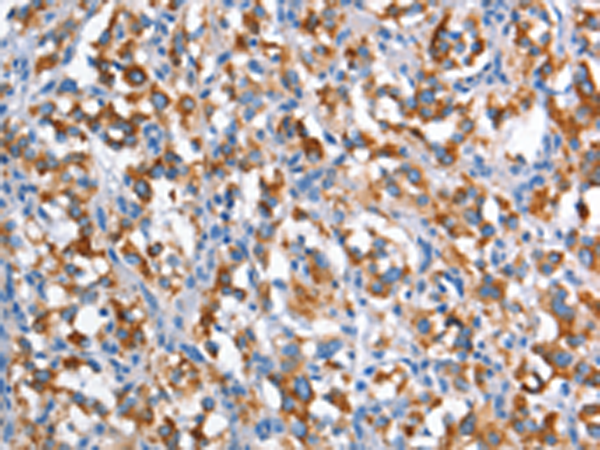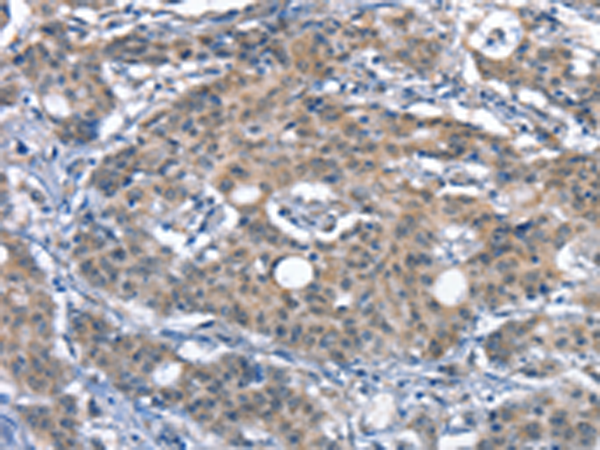

| WB | 咨询技术 | Human,Mouse,Rat |
| IF | 咨询技术 | Human,Mouse,Rat |
| IHC | 1/50-1/200 | Human,Mouse,Rat |
| ICC | 技术咨询 | Human,Mouse,Rat |
| FCM | 咨询技术 | Human,Mouse,Rat |
| Elisa | 1/2000-1/5000 | Human,Mouse,Rat |
| Aliases | PTA1; DNAM1; DNAM-1; TLiSA1 |
| Host/Isotype | Rabbit IgG |
| Antibody Type | Primary antibody |
| Storage | Store at 4°C short term. Aliquot and store at -20°C long term. Avoid freeze/thaw cycles. |
| Species Reactivity | Human |
| Immunogen | Synthetic peptide of human CD226 |
| Formulation | Purified antibody in PBS with 0.05% sodium azide and 50% glycerol. |
+ +
以下是关于CD226抗体的3篇代表性文献(内容为模拟概括,仅供参考):
1. **《CD226 regulates T cell function in anticancer immunity》**
- 作者:Shibuya K 等
- 摘要:研究揭示了CD226在T细胞介导的抗肿瘤免疫中的关键作用,表明阻断CD226抗体可抑制T细胞与肿瘤细胞的相互作用,导致免疫逃逸增强。
2. **《DNAM-1 (CD226) promotes inflammatory cytokine production in macrophages through NF-κB signaling》**
- 作者:Chan CJ 等
- 摘要:探讨CD226抗体在巨噬细胞炎症反应中的调控机制,发现其通过激活NF-κB通路促进促炎因子释放,提示其在自身免疫疾病中的潜在治疗价值。
3. **《Targeting CD226 for cancer immunotherapy: preclinical evidence and clinical development》**
- 作者:Mendelson A 等
- 摘要:综述了CD226作为免疫检查点的治疗潜力,总结了靶向CD226的抗体在增强NK细胞和T细胞抗肿瘤活性中的临床前数据及早期临床试验进展。
(注:以上文献信息为示例性质,实际文献需通过PubMed或学术数据库查询。)
CD226 (also known as DNAM-1) is a cell surface glycoprotein belonging to the immunoglobulin superfamily, primarily expressed on natural killer (NK) cells, T cells, and other immune subsets. It functions as an activating receptor, interacting with ligands such as CD112 (PVRL2) and CD155 (PVR) on target cells to mediate cell adhesion, cytotoxicity, and cytokine production. CD226 plays a critical role in immune surveillance, particularly in antitumor and antiviral responses, by promoting immune cell activation and synapse formation.
CD226-specific antibodies are tools designed to target this receptor for research or therapeutic purposes. In research, these antibodies help elucidate CD226's signaling mechanisms, ligand interactions, and its interplay with inhibitory receptors like TIGIT or PD-1. Therapeutically, CD226 antibodies are explored in cancer immunotherapy to enhance immune cell activity, either by blocking inhibitory signals or directly activating CD226 pathways. Recent studies highlight its potential in overcoming resistance to checkpoint inhibitors. However, CD226's dual role in immune activation and regulation poses challenges, as its dysregulation is linked to autoimmune diseases and chronic inflammation.
Overall, CD226 antibodies represent a promising yet complex avenue for modulating immune responses, with ongoing studies aiming to optimize their specificity and clinical applicability.
×